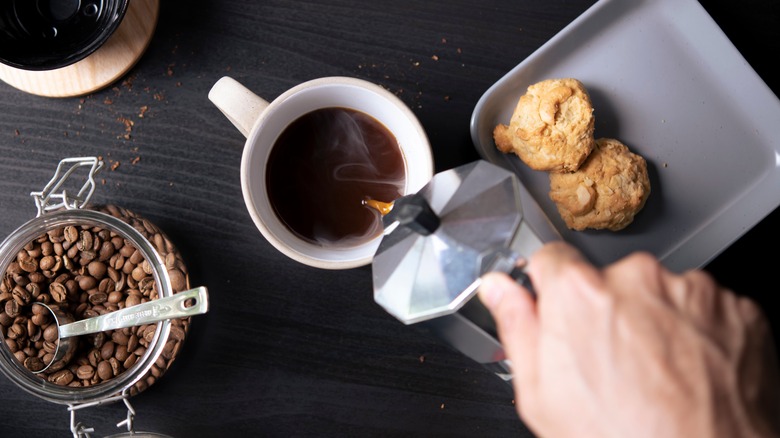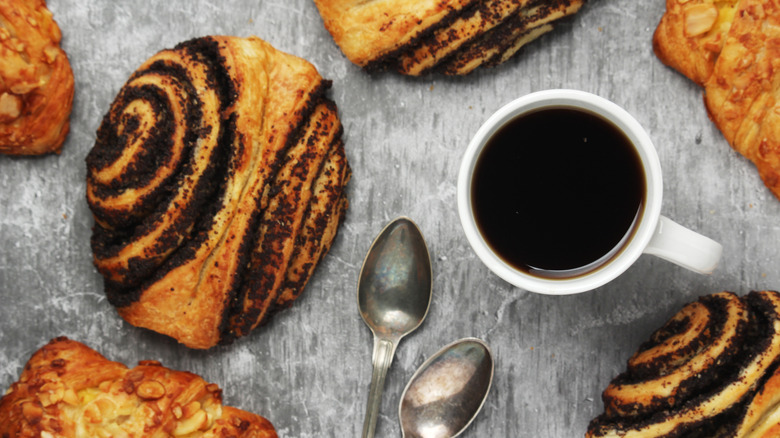Why You Should Embrace The Swedish Tradition Of Fika
Imagine a world where your word day coffee break wasn't only the time it took you to let your Keurig refill your mug before you're back to work. For Scandinavians, not only are actual work breaks during the day encouraged, but many have actual daily coffee breaks, what they call "fika," built into their work contracts (via Real Simple).
Both noun and verb, Serious Eats explains that in Nordic countries, "fika" translates to either coffee, a coffee shop, or the coffee break itself. But what makes these coffee breaks different — apart from being a true break from your work or school day— are that they're meant to be spent connecting with other people. "Most Swedes have fika several times a day," Matts Johansson, founder of Da Matteo, a coffee chain based in Gothenburg, told BBC. "It's about spending time with people, eating lovely homemade baked goods and drinking great coffee. It's like going to the pub in other countries."
Fika can also be compared to England's afternoon tea and much like with England, these traditions are generally followed by older generations, per Eater. Even if younger Scandinavians are moving away from the traditional coffee break, the idea, much like hygge, is being adopted by outside cultures. This isn't just some ploy to do less work, either; not only is nurturing connections with other people beneficial for improving your mind-body connection, there are also what Real Simple calls "therapeutic, restorative effects" to the breaks.
The long, weird history of coffee and fika in Sweden
For a country and culture that loves its coffee, the drink has an unexpectedly controversial history in Sweden. According to Vine Pair, coffee entered the country in the 1670s and spent the next century gaining popularity, especially with the wealthy. Originally, coffee wasn't even used as a social drink, according to the Scandinavia Standard. Until Sweden's King Charles XII started using coffee recreationally, coffee was "stockpiled by pharmacists to treat disease."
But just as coffee was gaining popularity in the early 1700s, with Stockholm's first coffee house opening in 1710, the bean became the center of controversy and class division, per Scandinavia Standard. The most expensive coffee you've ever bought may come close to the prices Scandinavians were paying for their afternoon pick-me-ups, which is what kicked off the first of five coffee bans in Sweden's history. The first, Scandinavia Standard reports, began in 1756 when the working class fought back against coffee's pricing and lasted for ten years.
The bans went into and out of effect for decades and finally ended under King Gustav III's reign in 1822. According to Real Simple, it took until the mid-to-late 1800s for the price of coffee to come down and for the drink to become a staple of daily life. Pastries known as fikabröd (fika bread) were also brought to the country around this time, creating the perfect pairing for daily breaks with friends, family, or co-workers.
This is why you should add fika to your routine
Fika is not just about worshipping at the altar of the coffee gods, hoping they get you through your work day. For companies like IKEA, fika is an important aspect of the company's culture. "Some of the best ideas and decisions happen at fika," BBC reports the company's corporate website saying. Part of this may be due to putting an intentional, informal pause on the day and building in time for co-workers to talk openly, away from their desks.
No matter what the reason, fika has had an extremely positive effect on workplace morale in Sweden. According to a 2010 Grant Thornton study, Swedish workers had the lowest stress levels of anyone in the world. According to QZ, this is because of Sweden's approach to the work day: work days generally last six hours, fika are mandatory, and barely anyone works overtime. While that might sound like a workflow nightmare, the OECD Better Life Index found that Swedes are no less productive than countries who pack their schedules with overtime.
"Studies show that people who take a break from their work do not do less," Viveka Adelsward, a professor at Linkoping University, wrote on the university's blog, per HuffPost. "It's actually the opposite; efficiency at work can benefit from [fika]." She adds these gatherings give people a chance to "blow the dust off [their] brains, fill them with inspiration from others, and have an opportunity to test [your] thoughts and ideas."
How to plan your own fika
For workers in Sweden and Finland, fika happens once in the morning and once in the afternoon, and are guaranteed by law, according to Serious Eats. Five minutes of paid break time are earned for every hour worked in a day — a very drastic difference from the United States, where breaks aren't federally guaranteed.
Feeling inspired to actually start taking fika during your work day? Us too. But before you get caught up in following steps to plan a perfect fika, Real Simple warns that stressing about rules defeats the whole purpose of fika, including sticking to drinking only coffee. Prefer tea? Have that instead. All you really need to do is make time to connect with someone. Walk away from your work, or whatever problem you're trying to solve, take a breath, and come back to it with the help of a fresh, outside perspective.
Don't be afraid to set your own rules, however. As Paste Magazine suggests, there can be something calming and ritualistic about even just preparing fika, whether it be brewing your own coffee or sitting in the same cozy spot every day in the cafe next door.
If you're still working remotely, don't worry: virtual fika is very much a thing. Companies like HubbleHQ started "Fika's Friday," to end each work week. Pairing off into groups of five, co-workers chat and snack over Zoom for a half hour, something any company or group of friends can replicate.



